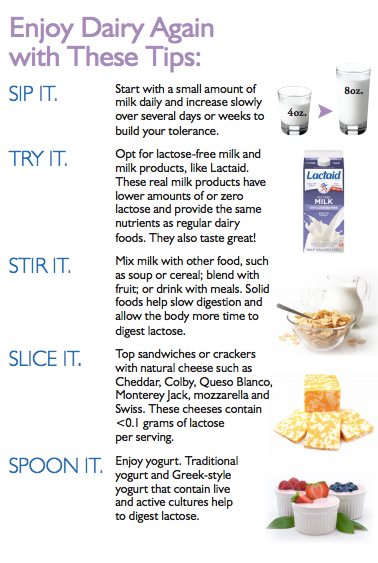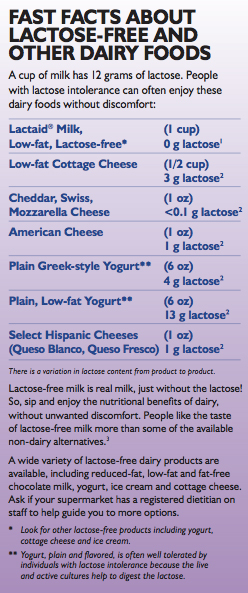If you’re like us, you’ve started to think more seriously about your diet than ever. And not just for weight loss purposes, but for the sake of optimum health and pinpointing which foods may be doing more harm than good.
My primary cause for concern is dairy as I was lactose intolerant growing up. Despite seemingly “outgrowing” my intolerance as an adult, I still notice that dairy can make me feel poor from time to time.
Lucky for me the National Dairy Council (NDC) is perking its ears to the cries of people like me and thousands of others who face similar intolerances. The good news is, these diet discrepancies don’t necessarily mean you have to give up dairy. It just means you have to learn which products may work best for you.
To spread the word about National Lactose Intolerance (LI) Month, the NDC held a Twitter party in late February to equip the LI population with helpful tools and resources to better manage their dietary needs. The council sought to inform the public of the important nutrients dairy can provide in our diets, as well as the many dairy products that those with LI can still consume.
We spoke with NDC’s vice president of health and wellness partnerships Karen Kafer, RD, to get a better grasp on LI and what those suffering from an intolerance may be overlooking when it comes to their diet.
Do you promote dairy alternatives for those with milk allergies/lactose intolerances?
Dairy’s nutrient package provides a unique opportunity to help people achieve more nutrition per calorie with foods they enjoy – whether or not they’re lactose intolerant. While soy, almond, coconut and other dairy alternatives may be fortified with calcium and other nutrients found in milk, their nutrient package is not necessarily the same as naturally found in milk.
 Why is Lactaid considered a better choice for those with dairy sensitivities?
Why is Lactaid considered a better choice for those with dairy sensitivities?
Lactose-free milk, like Lactaid, is real cow’s milk, just without the lactose, and provides the same essential nutrients – it’s an excellent source of calcium, vitamin D, vitamin B12, phosphorus and riboflavin and a good source of potassium, protein and vitamin A.
What would you say to people who believe consuming dairy is unnatural and unhealthy for our bodies (a wide-held opinion of many vegans)?
While everyone has their own approach to their own diet, for good health the Dietary Guidelines for Americans recommends people make wise choices from all five basic groups as each group contributes key nutrients to an individual’s diet. In fact, the DGA Committee actually evaluated what happens to the diet when you remove dairy products, showing a substantial drop in calcium intake, as well as shortages in vitamins A and D, magnesium and potassium.
How do certain foods have less lactose? Why is this important for the general public to know?
The biggest misconception I see when discussing lactose intolerance is that being lactose intolerant requires avoidance of all dairy products, which isn’t true. It’s all about learning what works best for you (see image on left), as different people can handle different amounts of lactose.
We believe it’s important for people to understand that lactose intolerance doesn’t mean dairy avoidance and it’s easy and delicious to prepare meals and snacks that include dairy.
Other resources that may be of interest include our Pinterest board, AllRecipes.com recipe page and the handout “Fall in Love With Dairy Again.”
Also Read:
Froyo or Ice Cream: Which is Healthier?
Food Allergies at Highest Level in History and Expected to Rise
Nifty Fare Serves Allergy-Friendly Foods with Artisan Flare
images via National Dairy Council
